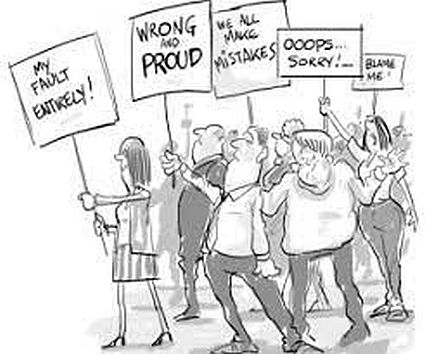The willingness to be wrong. Not quite the poster child for our daily affirmations wall, is it? “I will be wrong today. I will embrace failure. Errors are my best friends!” Nothing you see leaders bragging to each other about, “I was wrong more times than you! I win!”
But the willingness to be wrong, or perhaps, the willingness to admit that we were wrong is critical to our growth, learning, and ability to achieve our goals (individually and organizationally).
First off, nobody likes to be wrong. Not your customers, not your team, and especially not each of us. It’s discomforting, embarrassing. “Wrongness,” comes in all scales. Sometimes, it’s devastating, we may have made some decisions that result in huge loss, impacting everyone involved. More often, it’s the dozens of small errors we may make each week,
Too often, we are too proud to admit that we may have made a mistake. We, sometimes, make it worse, doubling down on a flawed strategy. Too often, we refuse to admit we made an error, blaming it on someone else, “it’s the product, it’s the customer, it’s the competition, it’s the economy, it’s our people, it’s my boss. Or, “Everyone else is doing the same thing.” All reminiscent of grade school, “My dog ate my homework….”
The reality is, we’re not infallible, and accepting this can do wonders for our mindsets, our growth, and our abilities to succeed. This concept isn’t new. Think of all the legendary innovators who’ve failed and stumbled before doing something that changes the world. We don’t remember them for their failures, rather we admire their successes.
Picture Thomas Edison at his workbench, having just discovered the 10,000th way NOT to make a light bulb. Instead of chalking it up as another failure, he says, “We’ve just discovered one more way it won’t work! We’re rolling now!” When we are wrong, it’s not a dead end. It’s a detour sign, redirecting us to better ideas. (Hesitated with this example, wondering if I’d start seeing, “We’ve discovered 10,000 bad email prospecting approaches….”)
Or Abraham Lincoln, whose failures were notable—failed businesses, many failed political campaigns until being elected president, “My great concern is not whether you failed, but whether you are content with your failure.”
We tend to learn more from our failures, than we do from our successes. Hopefully, we pause, try to understand why we failed. Not to assign blame, but to consider new approaches, to see what we might change. The willingness to be wrong, must be accompanies by the willingness to adapt, to change.
Too often, our fear of failure paralyzes us. When we need to take action, we fail, continuing to do the same incorrect things, over and over. Unwittingly, we become content with our failure. Fear of being “wrong,” is a disorder characterized by tunnel vision, deafness to feedback, and an unfortunate inability to see the rapidly changing market landscape. The prognosis for our inability to admit we may have been wrong isn’t good. And we’ve seen the results of that with year after year of declining results, employee disengagement/churn, customers choosing other engagement strategies.
The cure, however, is simple: admit when we wrong, learn, adapt, and move forward.
Of course, we aren’t aiming for failure, but we can’t let the fear of failure stop us. Just remember that every “failure” is a billboard suggesting, “This way to a better idea.”
At the end of the day, the best way to be right is to be willing to be wrong. To embrace the detours, to learn and adapt, sometimes just stumbling on the path to success.

Leave a Reply